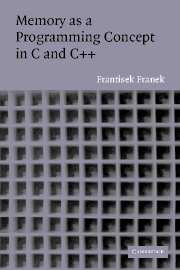Book contents
- Frontmatter
- Contents
- Acknowledgments
- Dedication
- 1 Introduction
- 2 From Source File to Executable File
- 3 Variables and Objects; Pointers and Addresses
- 4 Dynamic Allocation and Deallocation of Memory
- 5 Functions and Function Calls
- 6 One-Dimensional Arrays and Strings
- 7 Multi-Dimensional Arrays
- 8 Classes and Objects
- 9 Linked Data Structures
- 10 Memory Leaks and Their Debugging
- 11 Programs in Execution: Processes and Threads
- A Hanoi Towers Puzzle
- B Tracing Objects in C++
- C Tracing Objects and Memory in C++
- D Thread-Safe and Process - Safe Reporting and Logging Functions
- Glossary
- Index
10 - Memory Leaks and Their Debugging
Published online by Cambridge University Press: 13 January 2010
- Frontmatter
- Contents
- Acknowledgments
- Dedication
- 1 Introduction
- 2 From Source File to Executable File
- 3 Variables and Objects; Pointers and Addresses
- 4 Dynamic Allocation and Deallocation of Memory
- 5 Functions and Function Calls
- 6 One-Dimensional Arrays and Strings
- 7 Multi-Dimensional Arrays
- 8 Classes and Objects
- 9 Linked Data Structures
- 10 Memory Leaks and Their Debugging
- 11 Programs in Execution: Processes and Threads
- A Hanoi Towers Puzzle
- B Tracing Objects in C++
- C Tracing Objects and Memory in C++
- D Thread-Safe and Process - Safe Reporting and Logging Functions
- Glossary
- Index
Summary
Classification of the causes of memory leaks. Tracing memory leaks in C programs using location reporting and allocation/deallocation information-gathering versions of the C allocators and deallocators. Tracing memory leaks in C++ programs: overloading the operators new and delete and the problems it causes. Techniques for location tracing. Counting objects in C++. Smart pointers as a remedy for memory leaks caused by the undetermined ownership problem.
As mentioned previously, I do not like the terms “memory leaks” or “leaking memory”. They somehow put the onus on memory, as if it were the memory's inadequacy that caused the problem. Every time I hear a project manager or a student explain in a grave tone of voice that “the project is delayed because we have memory leaking”, I feel like retorting “OK, find a better memory that doesn't leak”. In truth, it's not the memory but rather the program that is inadequate. We should be talking about leaking programs, not about leaking memory. In this chapter we will classify the most common problems leading to memory leaks and discuss how to identify and locate them. We will start with trivial and obvious problems and proceed to more subtle ones that are harder to deal with.
The first class of memory leaks is called orphaned allocation and is characterized by allocation of a memory segment whose address is not preserved for later deallocation.
- Type
- Chapter
- Information
- Memory as a Programming Concept in C and C++ , pp. 159 - 186Publisher: Cambridge University PressPrint publication year: 2003



